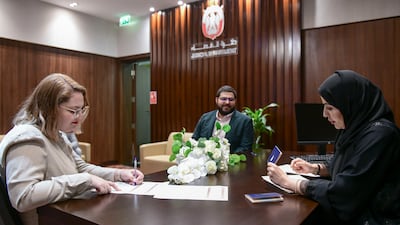More than 10,000 couples have been married in Abu Dhabi's civil marriage court since it held its first wedding in December 2021.
There were 5,000 marriages registered in the first year of the court and its popularity continues to rise as the court receives about 40 to 60 applications a day.
Last month, there were 1,400 civil marriages.
Abu Dhabi Civil Family Court allows applicants to marry and divorce in a non-Sharia process.
Applications can be submitted online for Dh300 ($81), which allows couples to tie the knot within a few weeks.
The Abu Dhabi Judicial Department also introduced an express service in August, which allows couples to get married within 24 hours of their application at a cost of Dh2,500.
The service is open to residents and tourists, including Muslims, but Emiratis are not allowed to get married at the court.
Couples getting married need to bring a passport and Emirates ID if they are UAE residents. Those who have been previously married need to bring proof that the marriage is now dissolved.
If a couple wishes to submit a marriage/prenuptial agreement, this can be submitted with the civil marriage application at a cost of Dh950 for the agreement to be notarised.
The ceremony takes about 15 minutes.
Abu Dhabi Judicial Department said 150 nationalities have used the service, with the Philippines and India topping the list, followed by the UK, Pakistan, Egypt, the US, Russia, Morocco and Lebanon.
There have been three marriages involving Iranian couples and one from Saudi Arabia.
The court registered its first marriage between an Israeli couple in September.
Other services
Abu Dhabi Civil Family Court also hears cases of no-fault civil divorce, joint custody of children, civil wills and inheritance, and proof of parentage.
In cases of a custody dispute, the court can be asked to intervene and make a decision with the best interests of the child always the primary consideration.
In April, the court granted full custody to an expatriate father in what was described as an "historic" ruling by his legal team.
Previously, only the mother would have had custody of the children until they reached puberty, classified as 11 years old for girls and 13 for boys, and the father could claim custody only when the child had reached those ages.








